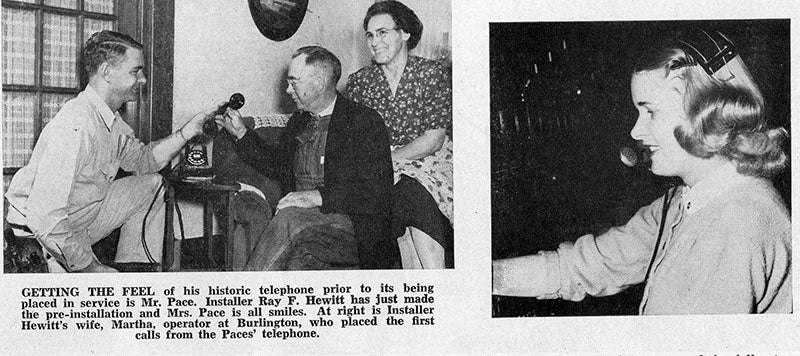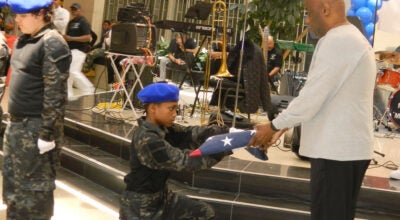President Truman on the line: Ray and Martha Hewitt played role in historic 1948 telephone call
Published 12:05 am Thursday, January 5, 2017

- Submitted photo In this photograph from the January 1949 issue of Southern Telephone News, Ray F. Hewitt, left, a telephone installer for Southern Bell, hands the receiver to W.J. Pace of Alamance County, who received this telephone on Dec. 16, 1948. Pace used the telephone to call President Harry S. Truman at the White House in recognition of its being the millionth rural telephone installed by the Bell System after World War II. Hewitt, the installer, grew up in Rowan and Iredell counties, and his wife, Martha (far right), was the telephone operator who connected Pace to the president and other dignitaries that day.
By Mark Wineka
mark.wineka@salisburypost.com
SALISBURY — During World War II, a German submarine torpedoed the U.S. Navy ship of Ray Hewitt off the coast of North Carolina.
Hewitt spent the next 24 hours in the water, gulping some of the oil from the Liberty transport’s wreckage, until he and other surviving sailors were rescued.
A native of Elmwood and a 1943 graduate of the old Cleveland High School, Hewitt lived a full, happy life after the war. At his death in 2010 in Burlington, his obituary noted how avid a hunter and fisherman he had been.
He even was a member of the Fisherman Sunday School Class at First Baptist Church in Burlington.
Hewitt also belonged to the Telephone Pioneers of America, and though he and his wife, Martha, seldom talked about it much, they participated in a historic telephone event, long forgotten in these days of wireless communication and “devices.”
On Dec. 16, 1948, while working for Southern Bell, Ray Hewitt installed a telephone in the home of Mr. and Mrs. W.J. Pace. Pace was a farmer in Alamance County, and his home represented the millionth rural telephone that had been added by the Bell System since the end of World War II.
This may not sound like a big deal now, but it was then. The Bell System had set a goal after V-J Day of adding a million rural telephones within five years. The company accomplished its goal in just less than three years.
After Hewitt installed the telephone, Martha, a telephone operator in Burlington, made the connections so that Pace could speak with several dignitaries, chief among them President Harry S. Truman at the White House.
The president’s number: National 1414. The Paces’ new number: 6-7542.
Everyone seemed to be crammed into the Paces’ farmhouse that day for the historic calls on the millionth rural telephone. There was a film crew. But more important, at least 15 minutes of the ceremonial calls and conversations were broadcast live by WPTF Radio in Raleigh.
In all, 16 N.C. radio stations carried the broadcast.
Also at the house were U.S. Sen. J. Melville Broughton, Gov.-elect W. Kerr Scott, Southern Bell President Hal S. Dumas and radio star of the day Kay Kyser.
With Martha Hewitt’s help at her switchboard in Burlington, Broughton made the call to Truman and introduced him to Pace. The farmer and the president had a nice, informal conversation.
“The president’s words cannot be heard,” the Southern Telephone News would report later, “but whatever he is saying seems to be pleasing farmer Pace. Mrs. Pace smiles as she watches her husband and looks mighty proud.”
When the president’s call ended, Dumas called the New York office of AT&T President Leroy A. Wilson, and Pace spoke with him.
Dumas also placed a call to Gov. R. Gregg Cherry, who interrupted a budget meeting in Raleigh. After a while, the Paces themselves were allowed to use their telephone to reach people they knew.
Mrs. Pace wanted to call her sister in Charleston, S.C., “but everyone is talking so much that she has to postpone it,” Southern Telephone News said.
It wasn’t long before Martha Hewitt entered the house. Telephone officials rushed her to the farm from Burlington after she had handled all the important calls. But the hectic day for the Paces was just beginning.
Burlington radio station WBBB set up its equipment in the kitchen and for 30 minutes interviewed the dignitaries still remaining, the Paces, and both Ray and Martha Hewitt.
“It’s going to be awful lonesome after this,” Pace told WBBB announcer E.Z. “Easy” Jones about all the people in his house.
A pastor gave a blessing, the house cleared, and the Hewitts and a couple of hundred other folks went outside to enjoy barbecue chicken, pork, Brunswick stew and all the fixings provided by Southern Bell.
The Paces — and to some extent, the Hewitts, too — dealt with more interviews from newspaper reporters and more pictures from photographers.
In installing the million rural telephones after the end of the war, the Bell System beat every prewar record three times over and was adding rural telephones at a rate of 1,000 a day. The telephone lines that came with the new phones could wrap the world nearly three times.
Martha Hewitt died last April at age 92. Her daughter, Julie Simpson of Matthews, found the Southern Telephone News’ January 1949 issue that prominently featured her parents and their role in telephone history.
“I knew it was packed up somewhere,” Simpson said. “It was just a matter of finding it.”
Ray Hewitt was one of nine children of John H. Sr. and Essie Hewitt. They lived in Elmwood near the Rowan-Iredell county line. The kids in the family, from oldest to youngest, were Irene, J.H. Jr., Annie, Coyt, Frances, Ray, Grover, Carlton (also known as “Boose”) and Nancy.
Boose and Annie are still living, and it turned out several of the Hewitts and their spouses would have a strong connection to Southern Bell. Ray, Martha, J.H. Jr., Boose and his wife, Janet, and Nancy and her husband, Eli, all worked at one time for the phone company.
After the war, Ray Hewitt used the G.I. Bill and attended Appalachian State University. He soon signed on with the telephone company and was assigned to Burlington, where he met Martha, already working as a telephone operator.
When Julie was born, Martha quit the telephone company, but Ray went on to be an engineer and made working for Southern Bell his career. Julie says her father often attended annual reunions of sorts with his classmates from Cleveland High.
Meanwhile, Ray and Martha’s 15 minutes of fame at the Pace farmhouse in 1948 faded into history.
“It was just something in life that happens,” Julie says. “It was a historical thing, but to them they were just asked to do something for their job, and they did it.
“They never made a big deal about it.”
One thing Julie will always remember about her father was how whenever the family went to the beach, he had an uncanny ability to float in the ocean for hours.
Maybe he could thank the Germans for that.
Contact Mark Wineka at 704-797-4263, or mark.wineka@salisburypost.com.



